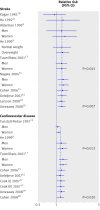Salt intake, stroke, and cardiovascular disease: meta-analysis of prospective studies
- PMID: 19934192
- PMCID: PMC2782060
- DOI: 10.1136/bmj.b4567
Salt intake, stroke, and cardiovascular disease: meta-analysis of prospective studies
Abstract
Objective: To assess the relation between the level of habitual salt intake and stroke or total cardiovascular disease outcome.
Design: Systematic review and meta-analysis of prospective studies published 1966-2008.
Data sources: Medline (1966-2008), Embase (from 1988), AMED (from 1985), CINAHL (from 1982), Psychinfo (from 1985), and the Cochrane Library. Review methods For each study, relative risks and 95% confidence intervals were extracted and pooled with a random effect model, weighting for the inverse of the variance. Heterogeneity, publication bias, subgroup, and meta-regression analyses were performed. Criteria for inclusion were prospective adult population study, assessment of salt intake as baseline exposure, assessment of either stroke or total cardiovascular disease as outcome, follow-up of at least three years, indication of number of participants exposed and number of events across different salt intake categories.
Results: There were 19 independent cohort samples from 13 studies, with 177 025 participants (follow-up 3.5-19 years) and over 11 000 vascular events. Higher salt intake was associated with greater risk of stroke (pooled relative risk 1.23, 95% confidence interval 1.06 to 1.43; P=0.007) and cardiovascular disease (1.14, 0.99 to 1.32; P=0.07), with no significant evidence of publication bias. For cardiovascular disease, sensitivity analysis showed that the exclusion of a single study led to a pooled estimate of 1.17 (1.02 to 1.34; P=0.02). The associations observed were greater the larger the difference in sodium intake and the longer the follow-up.
Conclusions: High salt intake is associated with significantly increased risk of stroke and total cardiovascular disease. Because of imprecision in measurement of salt intake, these effect sizes are likely to be underestimated. These results support the role of a substantial population reduction in salt intake for the prevention of cardiovascular disease.
Conflict of interest statement
Competing interests: None declared.
Figures



Comment in
-
The case for population-wide salt reduction gets stronger.BMJ. 2009 Nov 24;339:b4980. doi: 10.1136/bmj.b4980. BMJ. 2009. PMID: 19934193 No abstract available.
References
-
- He FJ, MacGregor GA. A comprehensive review on salt and health and current experience of worldwide salt reduction programmes. J Hum Hypertens 2009;23:363-84. - PubMed
-
- World Health Organization. Reducing salt intake in populations: report of a WHO forum and technical meeting. WHO, 2007:1-60.
-
- He FJ, MacGregor GA. Effect of modest salt reduction on blood pressure: a meta-analysis of randomized trials. Implications for public health. J Hum Hypertens 2002;16:761-70. - PubMed
-
- He FJ, MacGregor GA. How far should salt intake be reduced? Hypertension 2003;42:1093-9. - PubMed
-
- Moher D, Cook DJ, Eastwood S, Olkin I, Rennie D, Stroup DF. Improving the quality of reports of meta-analyses of randomised controlled trials: the QUOROM statement. Quality of reporting of meta-analyses. Lancet 1999;354:1896-900. - PubMed
Publication types
MeSH terms
Substances
LinkOut - more resources
Full Text Sources
Other Literature Sources
Medical
